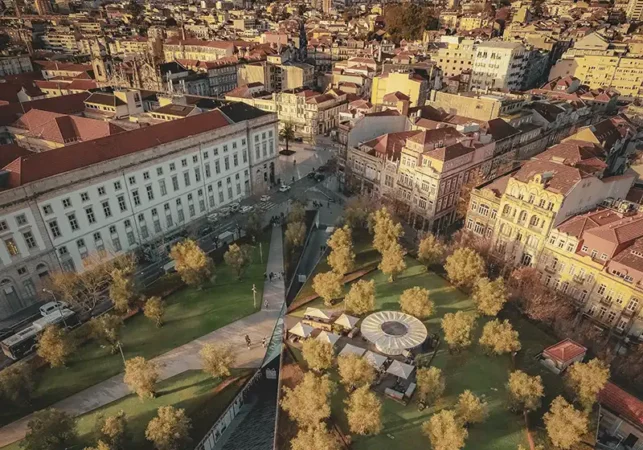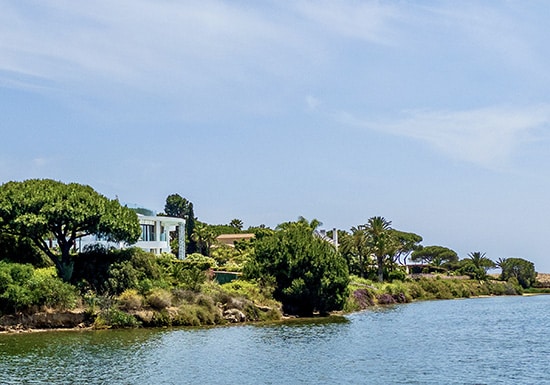Updated: December 8, 2025
Ever since the UK left the European Union in January 2020, many British nationals and global investors became worried about whether buying property in Portugal after Brexit was still available.
Portugal remains one of Europe’s most sought-after places for real estate investment. Because of Brexit, Brits are no longer considered EU citizens, and since Portugal is a member of the EU, it is normal to be worried.
The good news is that Brexit doesn’t affect your right to buy property in Portugal, but it has completely changed how long you can stay there. Whether you are looking to buy a holiday home, a rental property, an apartment, or commercial real estate, this guide is for you.
In this article, we will cover everything you need to know about your rights to buying property in Portugal from the UK, the changes to the real estate market with the Golden Visa, and the different options for residence.
Read more about:
Quick Summary
- Even if the United Kingdom is no longer part of the EU, as a British citizen, you can still purchase property in Portugal. But being a property owner doesn't make you a resident.
- Although the Golden Visa in Portugal is still open, you can’t become a resident through property investment. Instead, you must meet other eligibility criteria.
- Portugal remains accessible to you as always, regardless of whether you are buying, selling, or renting property, as the country doesn't restrict foreigners from owning property.
What Changed After Brexit for Buying Property in Portugal
As a British national, you can still buy property in Portugal. Brexit hasn’t changed your rights to purchase real estate, but it has changed the length of stay in the country. Portugal allows certain non-EU citizens, including those from the UK, to stay in the country up to 90 days in a 180-day period without a visa. For longer stays or a full-time move, you must obtain a residence permit or visa.
 What’s new on buying and selling property in Portugal after Brexit?
What’s new on buying and selling property in Portugal after Brexit?
Even though Brexit hasn’t affected your right to own real estate in Portugal, it has introduced a couple of changes to its investment, relocation, traveling, and residency protocols. Here is how Brexit is affecting UK buyers.
Can Brits still buy property in Portugal?
Yes, you can still purchase property in Portugal. The country does not have any restrictions on foreign property ownership, which means that Brexit does not prevent you from buying your dream home in Portugal.
Every type of property ownership in Portugal is available to UK citizens, such as full ownership, surface rights, co-ownership, and usufruct properties. So, the process for buying and selling property remains the same. You can own urban, rural, or commercial properties – sell them and rent them out.
 Changes to the right of stay
Changes to the right of stay
UK citizens are now considered “third-country nationals” or non-EU/EEA. This is the biggest change after Brexit that affects your stay in Portugal. Buying property in Portugal doesn’t make you a resident, so you can stay for 90 days within any 180-day period. You will need to apply for a suitable residence permit to stay longer or move there permanently.
 New residence document
New residence document
British nationals who were already living in Portugal had to exchange their old EU residence documentation (Certificado de Registo or Certificado de Residência Permanente) for a new biometric residence card that makes them a beneficiary of the Withdrawal Agreement. With it, they have the right to continue to live, work, and study in the country. This is an important step for those navigating their resident status.
Check our guide for more on property documentation in Portugal.
 Can British nationals still live in Portugal?
Can British nationals still live in Portugal?

If you do not have a permanent residence permit, British citizens can stay 90 days (within any 180-day period) in the country or the Schengen Area. They will need to secure legal residency through obtaining a residency visa, with options including the D7 Visa (passive income visa), D8 Visa (Digital Nomad Visa), or Golden Visa (residency by investment), although there are several other viable residency options.
Many British nationals are living in Porto and Lisbon. There are large expat communities, especially in big cities, which can be great when raising a family.
If you want to know what life is like here, check out our article on living in Portugal as an expat.
Mortgage Consideration for UK buyers
Brexit doesn’t affect your ability to take out mortgage loans in Portugal. The banks can still offer mortgage loans; however, you will face stricter lending criteria because they see you as a non-EU resident.
Foreign investors and non-residents often pay higher down payments, from 30 percent to 40 percent of the property value. On the other hand, residents and Portuguese citizens are more likely to qualify for a 10 percent or 20 percent lower down payment.
Looking to finance your Portuguese property? Find out how much you can borrow with our mortgage calculator in Portugal.
Step-by-Step Buying Process Post-Brexit

- Step 1. Decide on how you will finance the property (mortgages typically allow non-residents to borrow 20-40 percent of the property’s price).
- Step 2. Research the average property prices.
- Step 3. Negotiate based on the property value.
- Step 4. Find the right property either with the help of a buyer’s agent or a real estate agent.
- Step 5. Sign a Reservation Agreement.
- Step 6. Sign the Promissory Contract (CPCV), which outlines the terms of the purchase.
- Step 7. Finalize the purchase by signing the Escritura (Final Deed) and register the property.
You will need an NIF number (Portugal tax identification number), and it’s best to open a Portuguese bank account to make your life easier and save on costly currency exchange rates. We recommend working with local real estate agencies or a property lawyer and seeking financial assistance for a seamless buying experience.
Residency in Portugal after Brexit: Is the Golden Visa viable?

By 19 July 2023, the Parliament decided to revamp the Golden Visa scheme, redefining qualifying investments. After the enactment of the Mais Habitação bill, in October of that same year, all real estate investments, direct or indirect, were eliminated from the program. The Golden Visa still exists, but applicants must choose alternative investment routes.
So, even if you invest in commercial real estate in Portugal, you don’t automatically qualify as a resident.
 What hasn’t changed: investment alternatives after legislation
What hasn’t changed: investment alternatives after legislation
Since real estate purchases get excluded, other investment channels will remain, including:
- €500,000 in collective investment entities
- Investments generating jobs with a €500,000 minimum.
- Contributions to arts or sciences
Portugal’s Golden Visa remains a valuable component of the local economy, attracting significant foreign investment from foreigners who want to gain permanent residence in the EU.
Navigating Property Investment in Portugal post-Brexit
The Golden Visa’s real estate option is no longer viable, but avenues like job creation or arts and sciences contributions remain open.
If you are seeking Portuguese residency without having to contribute significantly to the country’s economy, the D7 or Digital Nomad Visa is a perfect option. The Digital Nomad Visa suits remote workers earning overseas, while the D7, also known as the Passive Income Visa or Retirement Visa, is for those with stable incomes like pensions, rentals, or dividends.
After obtaining legal residency in Portugal, consider exploring the real estate market in Lisbon, Porto, and the Algarve. These cities offer various living options, from coastal homes to apartments, studios, and townhouses.
Selling property
The selling process for second homeowners in Portugal after Brexit hasn’t changed, including costs and taxes on capital gains.
You would still have to pay property taxes in Portugal based on your residence status and the type of property you sell.
To recap the essentials, we’ve detailed the tax implications when renting property in Portugal,
The key taxes you’ll have to address include:
Rental income
When renting out your property in Portugal, you’ll be taxed on the net rental income at a flat rate of 28 percent. However, you can reduce this taxable amount with deductions, including:
- Mandatory fire insurance premiums.
- IMI expenses.
- Costs to obtain an energy certificate.
- Condominium fees (if applicable).
- Legally documented upkeep and maintenance costs (excluding furniture replacements).
- Conservation efforts have been undertaken within the past 24 months.
Please note that to claim tax deductions on rental property, you must provide an invoice detailing the work and property location. Rules are different for short and long-term rentals in Portuguese property.
Short-term rentals
- Require an Alojamento Local (AL) License
- Ideal for those staying in Portugal part-time, allowing rental income for the rest of the year
- Portugal’s climate, beaches, and history make it a lucrative rental market.
Long-term rentals
- Standard lease agreements are used.
- No need for an AL License.
Read our guide on the NHR 2.0 Program to learn more about the tax advantages for foreign nationals in Portugal. The local tax office can offer professional advice to foreign buyers for the notary and registration fees you can expect with Portuguese real estate.
Goldcrest: How We Can Help You
Goldcrest is a buyer’s agent that is based in Lisbon. We provide expert, impartial advice on real estate investments and how to buy property in Portugal. From scouting out the perfect property through to property acquisition, we have you covered throughout the process.
If you are looking to purchase property in Portugal, don’t hesitate to get in touch. Our team of skilled experts is available to solve all your real estate doubts, helping you with the property search and offering insightful expertise and strategic advice.
Why choose Goldcrest?
- Local knowledge: With offices located across Portugal, our presence nationwide allows us to assist you personally across the country.
- Independent service: As an independent buying agent, we do not represent any development or project. Our service is entirely tailored toward each individual client, providing you with everything you need to secure the perfect property at the best possible price. As an impartial advisor on the market, we work solely on behalf of our client and provide a service tailored to your needs and requirements.
- Streamlined process: Our real estate agents speak English and Portuguese, and our service is completely focused on providing you with a hassle-free buying experience, saving you time.
- Experienced team: Our expert real estate team has a vast local knowledge of the Portuguese property market. We have cutting-edge technology and metasearch tools at your disposal to provide full market coverage, ensuring the best investment choices and negotiated prices.
- Network of partners: We have a close network of partners, including lawyers, property management services, builders, architects, designers, and landscape gardeners, again saving you time and hassle by providing you with trusted experts in their field of work.
Frequently Asked Questions about Buying Property After Brexit
Can the British still buy property in Portugal after Brexit?
British citizens can still buy property in Portugal after Brexit, but if they are looking to live in the country for more than three months (in a six-month period), they will need to have a valid residency permit.
Can you get a Portuguese passport after Brexit?
Yes, you will, however, need to legally live in Portugal for five years before you can apply for Portuguese citizenship via naturalization.
How do you secure residency in Portugal after Brexit?
Residency options for UK citizens looking to relocate to Portugal include the Golden Visa, D7 Visa, and Digital Nomad Visa. The many different residency options are one key advantage of moving to Portugal.
How long can you stay in Portugal if you own a property?
Foreign ownership doesn’t guarantee prolonged stay rights. Depending on the country, non-EU residents can stay for up to 90 days within 180 days. A visa or residence permit is required for extended stays.
What are the rules for buying property in Portugal?
Foreigners can purchase property in Portugal without restrictions. However, a valid residency permit is essential to reside in the country and become a tax resident.
What taxes do you pay when buying property in Portugal?
When you buy property in Portugal, you pay taxes at the time of the purchase and annually after purchase. These expenses include the IMT (Municipal Property Transfer Tax) and Stamp Duty.
How long does it take to buy a home in Portugal?
Typically, it takes one to four months, with variations due to property conditions and complications. Legal representation is crucial. You can use a property finder in Portugal to find your new home and guide you through obtaining an NIF and opening a Portuguese bank account.
Can Brits retire in Portugal after Brexit?
Yes, British citizens can still retire in Portugal after Brexit, but the process for gaining residency is different than it was when the UK was part of the EU. They can choose the D7 Visa, also known as a retirement visa or a passive income visa. Another option is the Golden Visa, or Portugal’s residency by investment program.

